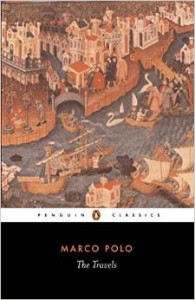 I just finished reading The Travels of Marco Polo with my older sons for school. The historical value of the breadth of information it contains about the eastern lands where Polo travelled is undeniable, but the telling itself is not very compelling. I expected a bit more narrative. While some stories are told, it is largely a catalogue, region by region, of various facts including religion, monetary practice, flora, fauna, and particular practices of the people. These facts are often related in a formulaic way so that it sounds like you are reading the same section over several times. You could get most of the value of the book by reading the prologue.
I just finished reading The Travels of Marco Polo with my older sons for school. The historical value of the breadth of information it contains about the eastern lands where Polo travelled is undeniable, but the telling itself is not very compelling. I expected a bit more narrative. While some stories are told, it is largely a catalogue, region by region, of various facts including religion, monetary practice, flora, fauna, and particular practices of the people. These facts are often related in a formulaic way so that it sounds like you are reading the same section over several times. You could get most of the value of the book by reading the prologue.
While not very exciting, there are interesting bits of information if you are looking. I was intrigued to hear how far Christianity had spread into the east with Christians being reported in many of the regions described, sometimes just a few, sometimes a significant group. The main religions were idolatry, Islam (he calls them Saracens) and Christianity. Polo described one group who had somewhere in the past lost much of their religion but continued to cling to what was remembered from their fathers. When Polo investigated he saw the “holy book” they were using was the Psalter and he recognized them as Christians.
The peoples described varied in many ways. The most striking thing to me about the habits of the people across this wide area was the rampant sexual immorality. The immorality took various forms but in most places it was an accepted way of life.
The saddest story concerns Kubilai Khan’s request for Christian missionaries to come and teach the gospel to him and his people. The Khan was interested in becoming a Christian but required people to come to teach the truths of this religion so his people could understand and so he could make a reasonable decision to accept it. As the prologue relates:
He [Kubilai Khan] sent word to the Pope that he should send up to a hundred men learned in the Christian religion … and skilled to argue and demonstrate plainly to idolaters and those of other persuasions that their religion is utterly mistaken and that all the idols which they keep in their houses and worship are things of the Devil- men able to show by clear reasoning that the Christian religion is better than theirs. (36)
However, when Polo’s father and uncle returned to Italy they found the Pope had died, and they waited for two years with no Pope being elected due to conflicting interests in the church. The decided to return anyway (this time taking young Marco with them), and just in time were finally sent two friars to take on the missionary work. However, before they had gotten past modern day Turkey they came into difficulty so that the friars “were scared at the prospect of going farther” (39). The Polos went on, but the missionaries did not.
So, the ruler of much of the Far East requests missionaries but fulfillment of the request is delayed due to division within the church. Then, finally two missionaries are sent (although up to 100 were requested), only to turn back early on due to fear of personal safety. The explorers/businessmen continued, but the missionaries did not. What a rebuke.
Though this is not a thrilling read, there is much to be pondered here concerning missions and Christian involvement in non-Christian societies.
[We read the Penguin Classics edition, and page numbers refer to this edition. Other editions may vary since there is an interesting textual history to this book. The Penguin edition does text critical work to draw from the differing manuscripts]